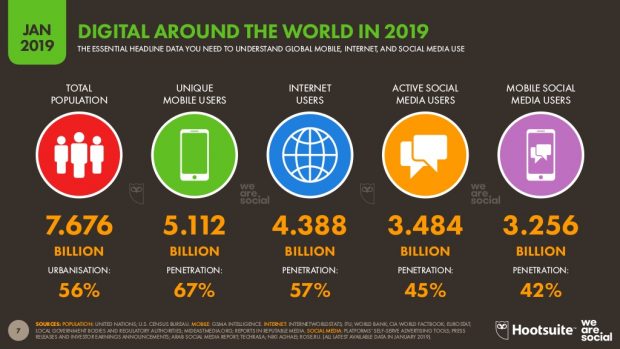Your Startup on Social Media
Getting your startup business on social media has never been as important and with 3.48 billion people now use social media, that’s an increase of 9% from last year1. This means an astonishing 45% of the total world population are using social networks, and that is growing every day.

Check out my 5-step process to help your startup get started.
- Set S.M.A.R.T Goals – Make sure your goals are specific, measurable, attainable, relevant and time-bound. For example, you may want 50 new followers in 30 days. Use analytics platforms to track your online activity in real-time, we use and recommend Cyfe.
- Competitors – Look at your competitors by conducting a competitive analysis that will help you to understand who your competitors are and spot any opportunities, strengths and take advantage of their weaknesses. This is also a great way to draw on inspiration from other businesses that are great on social media, taking note on the different types of content they publish and how they engage with their audience.
- Set up Accounts – Determine which platforms you are going to use, looking at those where your target audience lie. Set up and optimise your accounts, completing all profile fields using your industry specific keywords and any hashtags, use branded images that correctly reflect your new start-up and are correctly sized for each individual platform.
- Start a Social Media Calendar – Start creating a content schedule that lists the date, time and different types of content for each channel. Use a social media management platform, which will help you to makes finding, scheduling, managing, and reporting on social media content much easier, we use and recommend Hootsuite.
- Test, Measure and Test Again – Tracking your activity and data using one of the monitoring tools above will help you to see what works and what doesn’t. Evaluate and test again until you see what works and what doesn’t.
Summary
Help to improve your startup’s brand loyalty, engage with your audience, and build stronger client relationships by getting on social media. This will set you apart from your competitors by showing your audience how your company is different and reinforcing that your business is the experts in their field.
Should you have any questions please don’t hesitate to get in touch, whether that’s for a bespoke LinkedIn workshop for you or your team, a face to face or a remote-based one to one workshop or ongoing, outsourced social media marketing support.
1 Hootsuite